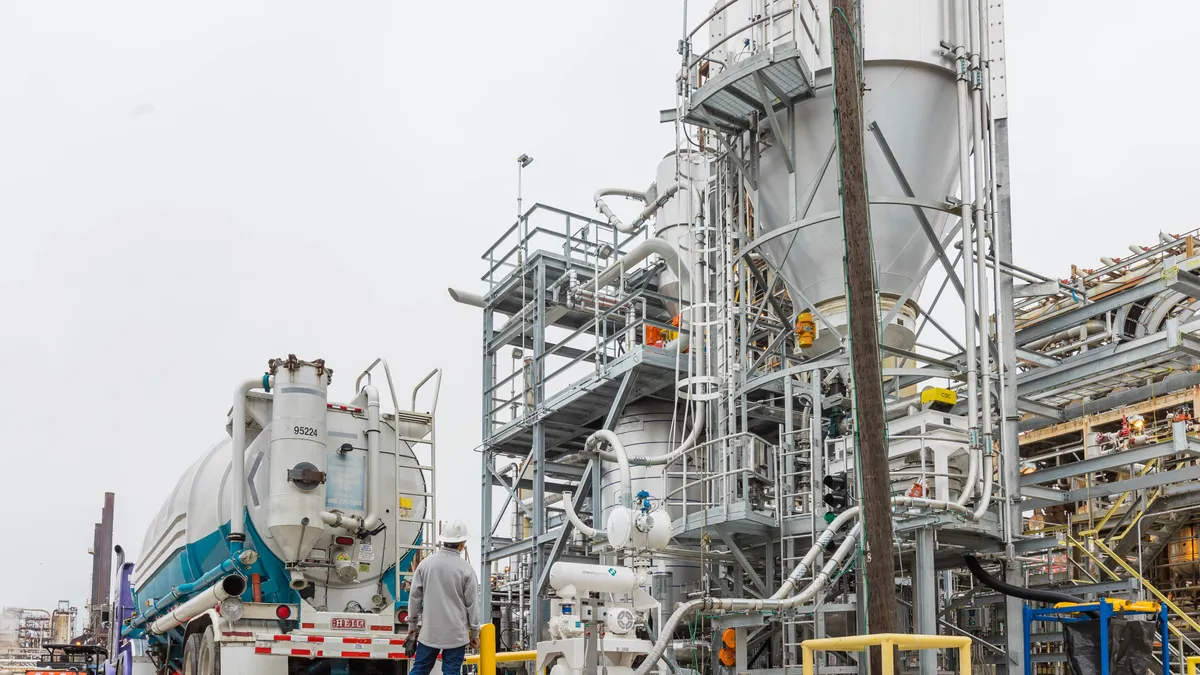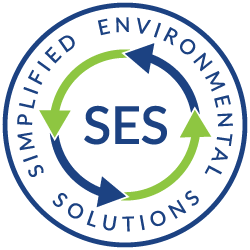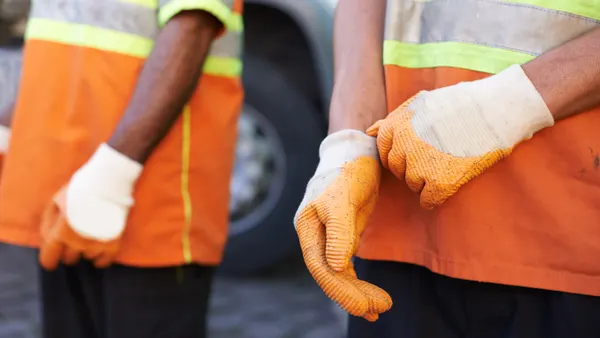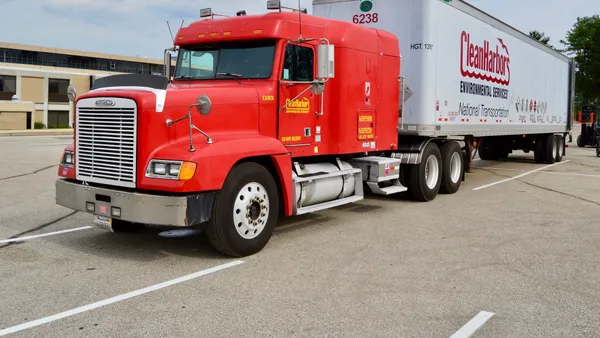Dive Brief:
- The U.S. Plastics Pact published a position paper on chemical recycling, which aims to evaluate both the “potential benefits and their associated concerns” as the industry continues to invest in the suite of technologies.
- USPP says it “supports the responsible integration” of chemical recycling technologies within a broader circular economy system meant to reduce plastic waste and reliance on virgin plastic. “These technologies may offer solutions for specific hard-to-recycle formats but must not displace efforts focused on reduction, reuse, or mechanical recycling,” it said.
- USPP advocates for chemical recyclers to consider environmental justice and health impacts when siting facilities, as well as running such facilities in a way that it has lower emissions than virgin plastic production. It also called for more transparent data collection and third-party lifecycle analysis work to gain more insight into chemical recycling’s true output and effectiveness.
Dive Insight:
USPP’s position paper aims to strike a balance between what the organization considers polarizing opinions on the technologies. That divide can make it harder to fairly evaluate future impacts of chemical recycling on the greater circular economy, the position paper said.
“Too often, these technologies are talked about in extremes — either as a silver bullet or as something to be dismissed outright,” said Jonathan Quinn, president and CEO of the USPP, in a statement.
Chemical recycling, sometimes called advanced or molecular recycling, is a suite of technologies meant to break down plastics to their molecular building blocks to be made into new plastics.
Quinn said the industry, along with organizations signed onto the U.S. Plastics Pact, should think critically about chemical recycling’s potential but also “wrestle with hard problems and consider data-driven real-world solutions.” USPP was created to get major brands and organizations together, in part around shared packaging sustainability goals.
Chemical recycling has recently been a subject of both scrutiny and discussion, including at the federal level. At a congressional hearing in July, some lawmakers and plastics industry groups framed chemical recycling as an economic driver, while other officials and environmental advocates voiced concerns over the technologies’ potential health and environmental risks.
The position paper comes a few days after ExxonMobil announced it hosted U.S. EPA Administrator Lee Zeldin at its chemical recycling plant in Baytown, Texas. That facility has processed about 100 million pounds of plastics since it opened in 2022, the company said.
“You’re seeing a proof of concept on advanced recycling get developed in a way that may inspire other cities and really this entire country,” Zeldin said in a video about the visit. “The capital investment seems to be extraordinary, and the future potential here seems to be limitless.”
USPP’s position paper calls on the industry to use the EPA’s Waste Management Hierarchy “to prioritize solutions with lower environmental impact.” USPP sees the ideal hierarchy order as starting with source reduction and reuse, followed by mechanical recycling. Chemical recycling would come next in the hierarchy “for formats that cannot be addressed otherwise.”
USPP sees chemical recycling as having the potential to capture more kinds of plastics for recycling, specifically hard-to-recycle types such as films and flexible plastics as well as some food-contact packaging that must meet strict FDA requirements.
It notes that some methods of chemical recycling use heat or chemicals that “can remove more contaminants than just washing the plastic, providing an opportunity to use PCR in some food-contact or medical-grade packaging with stringent quality requirements that cannot otherwise use PCR.”
USPP also sees chemical recycling as a key method for reducing reliance on virgin plastic and boosting the overall economics for recycled content.
The paper also notes that chemical recycling may be an avenue for advancing certain textile recycling goals, since some clothing and carpet are difficult to mechanically recycle. But chemical recyclers should avoid processing items that are “easily handled by mechanical recycling, such as PET bottles,” it said.
Some environmental activists and lawmakers have expressed concerns about chemical recycling’s impact on the environment and human health, a viewpoint that has been a rallying point for community groups who oppose chemical recycling facilities near their homes.
USPP urges the industry to include environmental justice considerations in all siting decisions. It recommends using tools such as California’s Enviroscreen or the archived federal EPA’s EJ Screen tool to determine where communities are most impacted by cumulative impacts of pollution.
The EPA under the Biden administration considered environmental justice an important pillar of its work, but earlier this year, the EPA under the Trump administration closed all of its EJ-related offices and shut down the EJ Screen tool, along with associated initiatives.
USPP “strongly supports the federal government resuming work to identify environmental justice communities and providing this information for companies to use in siting decisions,” it said.
USPP advocates for the chemical recycling industry to adopt manufacturing and regulatory best practices meant to protect surrounding communities that ensure safe chemical handling and disposal. USPP also suggests the industry adopt standards such as setting aside funding for potential environmental cleanup or remediation issues that might arise. “Robust standards and safeguards are essential,” USPP said in the report.
USPP also advocates for “use of fair and transparent lifecycle assessments or environmental benchmarks in evaluating facilities” to determine environmental impacts compared to virgin plastic production. An independent third party should evaluate the LCA for credibility, USPP said.
Overall, the chemical recycling industry should also work to adopt standardized systems for metrics such as recycling tonnages, chain of custody certifications and mass balance calculations, it said.
Other recycling and waste groups have also offered updated positions on chemical recycling this year. The Zero Waste International Alliance updated its zero waste hierarchy to account for chemical recycling, while the National Recycling Coalition’s recently updated policy specified that processes which turn plastic into fuel are not considered recycling.














